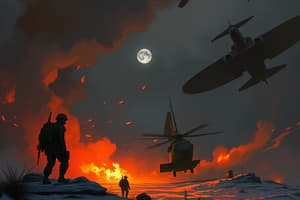Podcast
Questions and Answers
What is O'Brien's relationship with Winston characterized by?
What is O'Brien's relationship with Winston characterized by?
- Love and admiration
- Fear and compliance
- Respect and hatred (correct)
- Indifference and disdain
Who is Syme and what happens to him in 1984?
Who is Syme and what happens to him in 1984?
Syme is a friend of Winston who works in the Research Department and is vaporized.
What privileges do members of the Inner Party have over Outer Party members?
What privileges do members of the Inner Party have over Outer Party members?
- More surveillance
- Restricted movements
- No personal servants
- Access to better food and living conditions (correct)
What is Room 101 known for?
What is Room 101 known for?
How does war in 1984 differ from war in our time?
How does war in 1984 differ from war in our time?
Who is Mr. Parsons?
Who is Mr. Parsons?
What does Mr. Charrington represent in the novel?
What does Mr. Charrington represent in the novel?
How do Winston and Julia end up in the Ministry of Love?
How do Winston and Julia end up in the Ministry of Love?
What is the significance of the posters in Oceania?
What is the significance of the posters in Oceania?
What does Goldstein's book reveal about life in Oceania?
What does Goldstein's book reveal about life in Oceania?
What does Big Brother symbolize?
What does Big Brother symbolize?
What does doublethink involve?
What does doublethink involve?
What is Newspeak?
What is Newspeak?
What is crimestop?
What is crimestop?
What constitutes facecrime?
What constitutes facecrime?
What do Winston's dreams represent?
What do Winston's dreams represent?
What are the ministries and their functions?
What are the ministries and their functions?
What are the Party's slogans?
What are the Party's slogans?
Study Notes
O'Brian and Winston's Relationship
- Winston experiences conflicting emotions toward O'Brien, feeling both respect and hatred, mirroring his feelings for the Inner Party.
- O'Brien exhibits indifference towards Winston, complicating their dynamic.
- He assures Winston in a moment of vulnerability that he has been watching over him and will "make you perfect."
Syme and Winston's Relationship
- Syme, a friend of Winston, works in the Research Department specializing in Newspeak.
- Winston believes Syme's intelligence and clarity put him at risk for vaporization, as the Party favors less aware citizens.
- Prophetic of fate, Syme is ultimately vaporized in Part 2 of the novel.
Inner and Outer Party Relationship
- Inner Party members ("The Party") govern and create policies, living privileged lives compared to other classes.
- Outer Party members handle the direct implementation of Party policies but possess no real power or freedom.
- Outer Party members are subjected to oppressive surveillance and strict behavioral regulations, living under constant scrutiny.
Room 101
- Room 101 serves as the ultimate torture chamber, exposing prisoners to their greatest fears to psychologically break them.
- This tactic demonstrates the Party’s control over individual psyche and will.
War in 1984 vs. Our Time
- The perpetual state of war in 1984 serves to keep citizens in a constant state of anxiety and anger.
- Unlike real-world conflicts that may be temporary, the wars in Oceania are designed for long-term psychological manipulation.
Mr. Parsons
- Tom Parsons represents the working-class proletariat, actively participating in Party programs while his children serve as government spies.
- His children's indoctrination leads to betraying him for expressing disloyal thoughts, illustrating the pervasive fear and control within society.
Mr. Charrington and His Shop
- Mr. Charrington shares Winston's nostalgia for the past and discusses antiques without probing into Winston's thoughts.
- He is revealed to be a member of the Thought Police, symbolizing betrayal and the brutal surveillance state.
Winston and Julia's Relationship
- Both are captured and tortured in the Ministry of Love, facing reeducation processes aimed at enforcing loyalty to Big Brother.
- Their relationship represents a flicker of rebellion against the Party's oppressive regimes.
Posters in the City
- The ubiquitous "Big Brother Is Watching You" posters reinforce the Party’s omnipresence and the psychological control over Oceania's citizens.
The Book
- "The Theory and Practice of Oligarchical Collectivism" by Emmanuel Goldstein serves as a critical thematic element that embodies Winston's struggle against the Party.
- The book symbolizes unfinished rebellion and unfulfilled dreams of freedom.
Key Themes
- The Power of Big Brother: Represents tyranny, instilling fear, devotion, and a focus for citizens' emotions.
- Freedom & Enslavement: Citizens are constantly monitored; free thought is severely punished.
- Appearances vs. Reality: The Party manipulates perceptions of loyalty, while actual dissent is rampant.
Irony in the Book
- The Party systematically destroys relationships, emotions, and the will to rebel, revealing the extent of their control over personal and social dynamics.
Dystopia
- A state characterized by fear, oppression, and dehumanization, as depicted through the Thought Police and the concept of vaporization.
- Orwell uses a futuristic setting to portray extreme governmental tyranny.
Doublethink
- The ability to hold contradictory beliefs, showcasing the manipulative language of the Party.
- Demonstrates how citizens can accept conflicting realities.
Newspeak
- Designed to limit freedom of thought, incorporating fewer words and eliminating negative terms.
- Creates a language that restricts the expression of dissent and personal emotions.
Crimestop and Facecrime
- Crimestop: A mental discipline preventing dangerous thoughts and ensuring loyalty to the Party.
- Facecrime: A punishable offense reflecting any dissent or disbelief in the Party's ideology through facial expression.
Winston's Dream
- Dreams signify Winston's guilt over his past and his longing for connection with those who share his anti-Party sentiments.
The Ministries
- Miniluv (Love), Minipax (Peace), Miniplenty (Plenty), Minitrue (Truth) serve contrasting roles that distort reality and govern life in Oceania.
Philosophy of the Superstates
- Neo-Bolshevism and Death-Worship dominate the ideologies of three superstates, kept hidden from the populace through doublethink.
Thought Police
- Secret police enforcing party obedience, punishing those who contemplate revolt through thoughtcrime.
Junior Spies
- Youth groups promoting loyalty to the Party, encouraging children to monitor and report disloyalty even among their families.
Proles and the Party
- Comprising 85% of the population, proles are largely ignored by the Party, allowing some semblance of freedom while remaining impoverished.
Heresy of Heresies
- The concept that external reality and personal experience are denied by Party ideology, emphasizing manipulation and control over truth.
Two Minutes Hate
- A daily ritual designed to unify Party members against enemies, reinforcing collective hatred and loyalty to Big Brother.
Goldstein
- Portrayed as the enemy and antagonist of the Party, figurehead of opposing ideologies within Oceania.
Party Slogans
- "War is Peace," "Freedom is Slavery," "Ignorance is Strength" embody the paradoxical nature of the Party's propaganda, subverting logical thought and fostering ignorance among citizens.
Studying That Suits You
Use AI to generate personalized quizzes and flashcards to suit your learning preferences.
Description
Explore the complex relationship between O'Brien and Winston in George Orwell's '1984'. This study guide flashcard discusses the conflicting emotions Winston experiences towards O'Brien, highlighting themes of respect, hatred, love, and disdain. Dive into the intricacies of their dynamic as you prepare for a deeper understanding of the novel.




